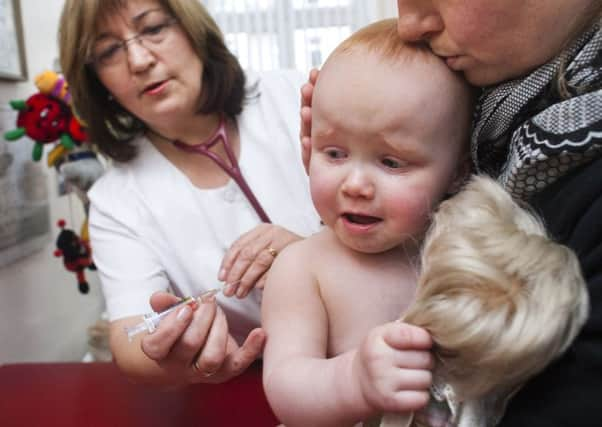Dani Garavelli: A deadly shot in the arm for anti-vaxxers


Wakefield’s 1998 study came in the wake of the government’s admission that it had been wrong about the risks of eating BSE-infected beef, so people were justifiably wary about official reassurances on public health matters. Unsettled, I explored possible alternatives – such as tracking down a GP willing to give each vaccine singly – before deciding, on my own doctor’s advice, to press ahead with the MMR.
Many other parents remained unconvinced. Even after Wakefield’s techniques were challenged, his research debunked and his reputation destroyed, public confidence was low. Nationally, the uptake of the MMR vaccine dropped to under 80 per cent and in some places less than 50 per cent of children had the recommended two doses. Cases of measles rose, reaching epidemic levels in 2005, and there were two deaths – the first the UK had seen in 14 years.
Advertisement
Hide AdAdvertisement
Hide AdThe MMR crisis was a catastrophe. Now – finally – uptake has returned to pre-1998 levels (with Scotland exceeding its 95 per cent target). So it is disheartening to see Wakefield back in the public eye, promoting a scaremongering documentary called Vaxxed.
Since 2004, Wakefield, who was struck off the medical register, has been living in Texas, one of the strongholds of the US anti-vaccination movement. But last week, he turned up at Regent’s University London to speak at Vaxxed’s UK “premiere”. The documentary, which presents Wakefield as a martyr and claims the US Centers for Disease Control and Prevention conspired to cover up a link between the vaccine and autism, has been condemned by the medical profession. Two venues – the Curzon cinema in Soho and the European Parliament in Brussels – refused to screen it and Regent’s University later claimed not to have been aware its building had been rented out for this purpose. The event attracted an audience of 350.
In the US, Wakefield is not quite the pariah figure he is in the UK. In fact, the anti-vaxx crusader has gathered a loyal band of followers around him. One shouldn’t overestimate the impact this small but vocal group has had, but in some states the number of parents opting out of inoculation does appear to be on the rise. One study found almost 45,000 children in Texas had refused vaccines in 2016, about double the number in 2010 and a 19-fold increase compared with 2003 (the year before Wakefield set up home there).
The big worry is that the Trump presidency – with its passion for pseudo-science and contempt for experts – will legitimise the anti-vaxxers. Faced with a measles outbreak in California – another hotbed of MMR resistance – Barack Obama was blunt: “You should get your children vaccinated,” he said, adding that the science around inoculation was “pretty indisputable”.
Contrast this with Trump’s unhinged raving. “Healthy young child goes to doctor, gets pumped with massive shot of many vaccines, doesn’t feel good and changes – AUTISM. Many such cases!” he tweeted in March 2014, not long before the Californian epidemic began.
In January, Trump met up with leading anti-vaxxer Robert F Kennedy Jr, who says the president is committed to setting up a commission on vaccine safety. Kennedy has made repeated claims that thimerosal in vaccines is linked to autism and ADHD, though there is no research to back him up and thimerosal hasn’t been used in children’s vaccines since 2001 (with the exception of the flu jab). He and actor Robert De Niro have offered $100,000 to anyone who can prove vaccines are safe, while a group of anti-vaxxers plans to march on Washington to defend their “legal right to make informed, voluntary vaccine choices”.
With US science policy now driven by ideology rather than evidence, we are ripe for another vaccination crisis. In an era where professionals are demeaned, paranoia is rife and the truth up for grabs, why wouldn’t parents swallow “alternative facts” on the risks of vaccinations or buy into conspiracy theories about Big Pharma cover-ups? It’s easier to accept at face value a heart-rending anecdote about a child who had the triple vaccine, and “turned” autistic, than it is to drill down into the research. Still, those who decide to opt out of vaccinations should know this: they are not merely putting their own children at risk. By reducing the overall take-up, they threaten the “herd immunity” conferred by mass inoculation and endanger others.
Living in an era where deadly diseases are rare has made us complacent. But I am currently reading Philip Roth’s Nemesis, a novel set during a polio epidemic in Newark, New Jersey, in the red-hot summer of 1944. Roth’s ability to capture the visceral fear of the contagion as it strikes down child after child, and the powerlessness of the community to stop it , has heightened my appreciation of the vaccine, introduced 11 years later. No more children dead, crippled or confined to iron lungs; no more summers spent avoiding playgrounds, swimming pools and other possible breeding grounds for germs. The anti-vaxxers play down the risks from measles, mumps and rubella, but they too are potentially fatal.
Advertisement
Hide AdAdvertisement
Hide AdHaving lived through the MMR scandal, we know the havoc false information can wreak. The consequences of Wakefield’s wilful recklessness are still being felt today. Anti-vaxxers are likely to be emboldened by Trump, whose approach is always to adopt the least scientifically sound stance and counter anything that undermines it with cries of “fake news”.
Those who have dedicated themselves to saving lives must continue to wage war against false claims and promote the value of vaccinations, so a toxic viewpoint confined – thus far – to cranks, doesn’t spread like a virus through the general population.